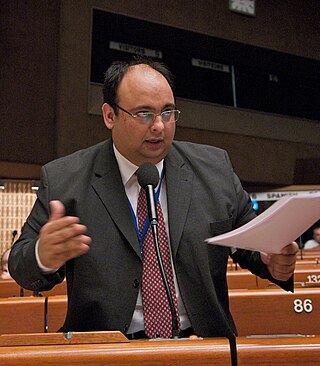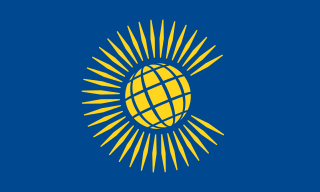Related Research Articles
The Commonwealth Heads of Government Meeting is a biennial summit meeting of the governmental leaders from all Commonwealth nations. Despite the name, the head of state may be present in the meeting instead of the head of government, especially among semi-presidential states. Every two years the meeting is held in a different member state and is chaired by that nation's respective prime minister or president, who becomes the Commonwealth Chair-in-Office until the next meeting. Queen Elizabeth II, who was the Head of the Commonwealth, attended every CHOGM beginning with Ottawa in 1973 until Perth in 2011, although her formal participation only began in 1997. She was represented by the Prince of Wales at the 2013 meeting as the 87-year-old monarch was curtailing long-distance travel. The Queen attended the 2015 summit in Malta and the 2018 summit in London, but was represented again by the Prince of Wales at the 2022 meeting in Rwanda.

The Commonwealth secretary-general is the head of the Commonwealth Secretariat, the central body which has served the Commonwealth of Nations since its establishment in 1965, and responsible for representing the Commonwealth publicly. The Commonwealth secretary-general should not be confused with the head of the Commonwealth.
The Commonwealth Parliamentary Association (CPA), previously known as the Empire Parliamentary Association, is an organisation which works to support good governance, democracy and human rights.

The Head of the Commonwealth is the ceremonial leader who symbolises "the free association of independent member nations" of the Commonwealth of Nations, an intergovernmental organisation that currently comprises 56 sovereign states. There is no set term of office or term limit and the role itself has no constitutional relevance to any of the member states within the Commonwealth. The position is currently held by King Charles III.

The African Peer Review Mechanism (APRM) is a mutually agreed instrument voluntarily acceded to by the member states of the African Union (AU) as a self-monitoring mechanism. It was founded in 2003.

Francis Martin O'Donnell, GCMM, GCEG, KC*SG, KM, KCHS, KCMCO,, an Irish citizen, has served abroad as an international diplomat in senior representative positions with the United Nations until retirement, and later with the Sovereign Military Order of Malta. He was elected President of the Genealogical Society of Ireland effective March 2024 He is a life member of the Institute of International and European Affairs. He currently continues to serve pro bono as an advisor to the Global Partnerships Forum and is a listed endorser of the NGO consortium known as Nonviolent Peaceforce. He served as Ambassador Extraordinary and Plenipotentiary of the Sovereign Military Order of Malta to the Slovak Republic from December 2009 to March 2013. He previously served as a United Nations official for 32 years, most recently as the Resident Coordinator of the United Nations system in Ukraine, from 30 September 2004 until 31 March 2009, and previously in the same capacity in Serbia-Montenegro. In early 2012, he was appointed to the Council of the Order of Clans of Ireland, and was elected its Chancellor in May 2014. He also served on the Board of Directors, and completed both terms of office in April 2015. Since then, he has participated in Globsec, the InterAction Council, and is a regular participant, panellist or moderator in the annual Global Baku Forum. He is also a speaker and panellist on global policy issues at seminars and forums of the Association of Schools of Political Studies of the Council of Europe, and is a director of the Board of Trustees of its School of Civic Education in London. He is a member of the Peacemaking Reflection Group of former senior UN officials under the auspices of the Foundation for Global Governance and Sustainability. He is an occasional guest speaker on Irish history and genealogy in Dublin, Madrid, Vienna, and at the Sorbonne in Paris. He is also a published author of a book and articles on global policy challenges, historical works and a first volume of poetry.
The Commonwealth Foundation (CF) is an intergovernmental organisation that was established by the Commonwealth Heads of Government in 1966, a year after its sister organisation, the Commonwealth Secretariat. The Foundation is located at Marlborough House in London, a former royal palace which was assigned for the use of these Commonwealth institutions by Her Majesty Queen Elizabeth II, the former Head of the Commonwealth. As the Commonwealth agency for civil society, the Foundation is funded by 49 member states to support participatory governance through its programmes. The Foundation provides resources, grants and access to platforms to encourage better engagement between civil society and institutions of governance. Membership of the Commonwealth Foundation is voluntary and is separate from membership of the Commonwealth of Nations.
The Edinburgh Declaration was a declaration by the heads of government of the Commonwealth of Nations concerning the organisation's membership criteria. Part of the final communiqué issued at the end of the fifteenth Commonwealth Heads of Government Meeting (CHOGM), the Declaration was an endorsement of the report of the Inter-Governmental Group on Criteria for Commonwealth Membership (IGCCM). It was issued on 27 October 1997, in Edinburgh, the United Kingdom.

Ian Micallef is the former President of the Chamber of Local Authorities of the Congress of the Council of Europe. He was elected to that position in May 2006 and re-elected on 27 May 2008 for a two-year period; he was also Acting President of the Congress from December 2008 to October 2010.
The Global Water Partnership (GWP) is an international network created to foster an integrated approach to water resources management (IWRM) and provide practical advice for sustainably managing water resources. It operates as a network, open to all organisations, including government institutions, agencies of the United Nations, bi- and multi-lateral development banks, professional associations, research institutions, non-governmental organisations, and the private sector.
The Commonwealth Youth Programme, also known as CYP, is an international development agency working with young people between the ages of 15 and 29. Part of the Commonwealth Secretariat, CYP is active in the Commonwealth's 54 member countries. CYP has a head office in London with four centres in Africa, Asia, Caribbean and Pacific. Currently there are Four Regional Directors and 16 programme officers plus support staff are working there.

The Commonwealth of Nations is a voluntary association of 56 sovereign states. Most of them were British colonies or dependencies of those colonies.

The Commonwealth of Nations, often simply referred to as the Commonwealth, is an international association of 56 member states, the vast majority of which are former territories of the British Empire from which it developed. They are connected through their use of the English language and historical-cultural ties. The chief institutions of the organisation are the Commonwealth Secretariat, which focuses on intergovernmental aspects, and the Commonwealth Foundation, which focuses on non-governmental relations among member states. Numerous organisations are associated with and operate within the Commonwealth.

The Union for the Mediterranean is an intergovernmental organization of 43 member states from Europe and the Mediterranean Basin: the 27 EU member states and 16 Mediterranean partner countries from North Africa, Western Asia and Southern Europe. It was founded on 13 July 2008 at the Paris Summit for the Mediterranean, with an aim of reinforcing the Euro-Mediterranean Partnership (Euromed) that was set up in 1995 as the Barcelona Process. Its general secretariat is located in Barcelona, Catalonia, Spain.

The International Institute for Sustainable Development (IISD) is an independent think tank founded in 1990 working to shape and inform international policy on sustainable development governance. The institute has three offices in Canada - Winnipeg, Ottawa, and Toronto, and one office in Geneva, Switzerland. It has over 150 staff and associates working in over 30 countries.

The Group of Seven Plus (g7+), established in 2010, is an intergovernmental voluntary organisation bringing together countries that are either facing active conflict or have recent experience of conflict and fragility. It has 20 member countries from Africa, Asia-Pacific, Middle East and the Caribbean with a combined population of 260 million.

The 2015 Commonwealth Heads of Government Meeting, also known as CHOGM 2015 was the 24th Meeting of the Heads of Government of the Commonwealth of Nations. It was held in Malta from 27 to 29 November. Sri Lankan President Maithripala Sirisena handed the position of Commonwealth Chair-in-Office to Maltese prime minister Joseph Muscat at the meeting.

The 2018 Commonwealth Heads of Government Meeting, also known as CHOGM 2018, was the 25th Meeting of the Heads of Government of the Commonwealth of Nations. It was held in the United Kingdom. The meeting had been planned to have been held by Vanuatu at the end of 2017, but was moved to the United Kingdom after the impact of Cyclone Pam on the infrastructure of Vanuatu. The meeting was then postponed to April 2018 due to other international commitments.
The Pacific Islands Private Sector Organisation (PIPSO) was established in 2007 to promote the private sector’s role in policy making and to encourage business development through effective partnerships with governments, regional organisations, development partners and NGOs. Its headquarters are in Suva, Fiji.
Carl W. Wright is a Commonwealth civil servant, former director of the Commonwealth Trade Union Group (1980–1994) and Secretary-General of the Commonwealth Local Government Forum (1994–2016). Author 'Global Citizen: Grass Roots Activism and High Diplomacy'
References
- ↑ "Commonwealth Local Government Forum (CLGF) | The Commonwealth". thecommonwealth.org. Archived from the original on 1 February 2019. Retrieved 14 October 2016.
- ↑ "Commonwealth Journal of Local Governance Issue 1 2008". UTS ePress. Retrieved 20 January 2023.
- ↑ "globaltaskforce2016". globaltaskforce2016. Retrieved 14 October 2016.
- ↑ "Our Members | Cities Alliance". www.citiesalliance.org. 9 August 2011. Retrieved 21 October 2016.
- ↑ "Commonwealth Journal of Local Governance". Archived from the original on 13 September 2009. Retrieved 18 September 2009.
- ↑ "The Queen launches new Commonwealth Hub | The Commonwealth". thecommonwealth.org. Retrieved 14 October 2016.
- ↑ "Commonwealth Local Government Forum - Conferences".